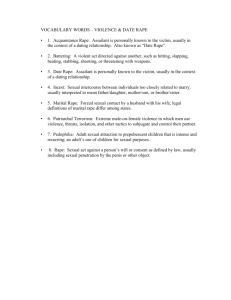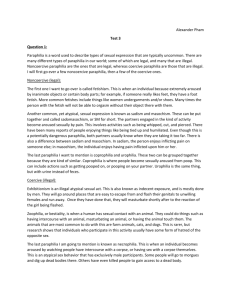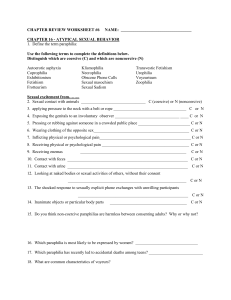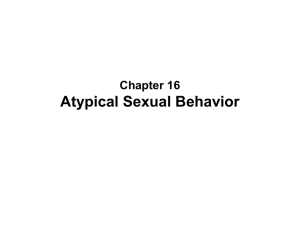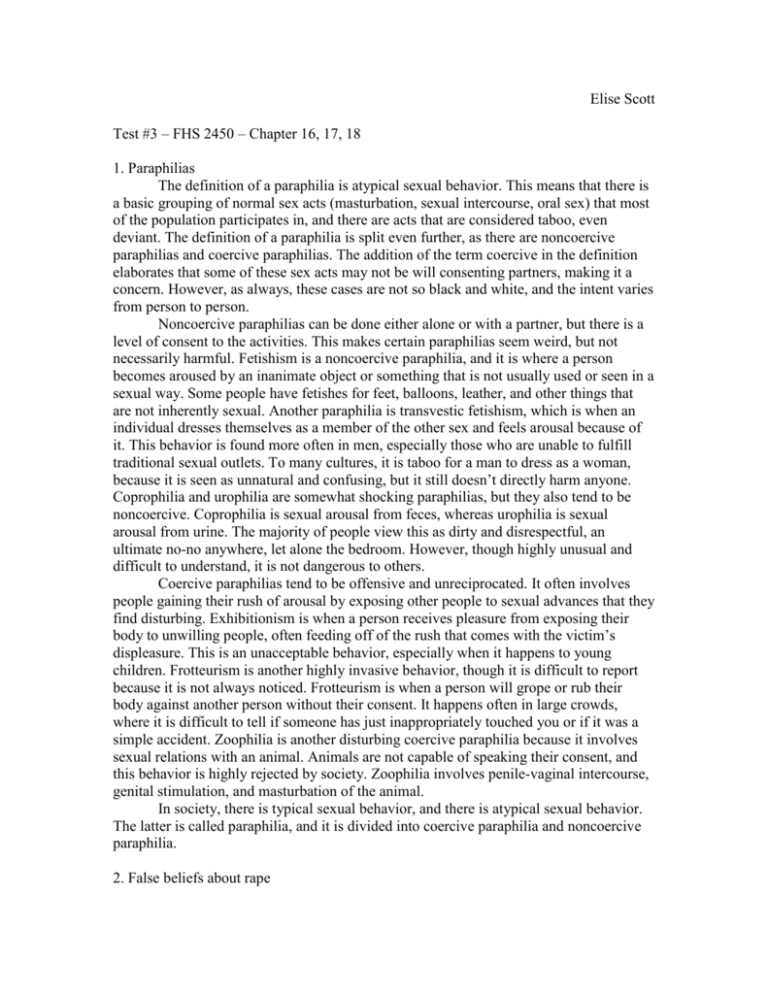
Elise Scott
Test #3 – FHS 2450 – Chapter 16, 17, 18
1. Paraphilias
The definition of a paraphilia is atypical sexual behavior. This means that there is
a basic grouping of normal sex acts (masturbation, sexual intercourse, oral sex) that most
of the population participates in, and there are acts that are considered taboo, even
deviant. The definition of a paraphilia is split even further, as there are noncoercive
paraphilias and coercive paraphilias. The addition of the term coercive in the definition
elaborates that some of these sex acts may not be will consenting partners, making it a
concern. However, as always, these cases are not so black and white, and the intent varies
from person to person.
Noncoercive paraphilias can be done either alone or with a partner, but there is a
level of consent to the activities. This makes certain paraphilias seem weird, but not
necessarily harmful. Fetishism is a noncoercive paraphilia, and it is where a person
becomes aroused by an inanimate object or something that is not usually used or seen in a
sexual way. Some people have fetishes for feet, balloons, leather, and other things that
are not inherently sexual. Another paraphilia is transvestic fetishism, which is when an
individual dresses themselves as a member of the other sex and feels arousal because of
it. This behavior is found more often in men, especially those who are unable to fulfill
traditional sexual outlets. To many cultures, it is taboo for a man to dress as a woman,
because it is seen as unnatural and confusing, but it still doesn’t directly harm anyone.
Coprophilia and urophilia are somewhat shocking paraphilias, but they also tend to be
noncoercive. Coprophilia is sexual arousal from feces, whereas urophilia is sexual
arousal from urine. The majority of people view this as dirty and disrespectful, an
ultimate no-no anywhere, let alone the bedroom. However, though highly unusual and
difficult to understand, it is not dangerous to others.
Coercive paraphilias tend to be offensive and unreciprocated. It often involves
people gaining their rush of arousal by exposing other people to sexual advances that they
find disturbing. Exhibitionism is when a person receives pleasure from exposing their
body to unwilling people, often feeding off of the rush that comes with the victim’s
displeasure. This is an unacceptable behavior, especially when it happens to young
children. Frotteurism is another highly invasive behavior, though it is difficult to report
because it is not always noticed. Frotteurism is when a person will grope or rub their
body against another person without their consent. It happens often in large crowds,
where it is difficult to tell if someone has just inappropriately touched you or if it was a
simple accident. Zoophilia is another disturbing coercive paraphilia because it involves
sexual relations with an animal. Animals are not capable of speaking their consent, and
this behavior is highly rejected by society. Zoophilia involves penile-vaginal intercourse,
genital stimulation, and masturbation of the animal.
In society, there is typical sexual behavior, and there is atypical sexual behavior.
The latter is called paraphilia, and it is divided into coercive paraphilia and noncoercive
paraphilia.
2. False beliefs about rape
There are so many false beliefs about rape that it is depressing to have to make a
list of them, because it shows how misinformed and often insensitive we are as a society.
Some people believe that men have an insatiable sex drive, and that they have difficulty
controlling themselves when they see scantily clad women, or apparently women in
general. By this logic, women ought to know that they must cover themselves for their
own protection, and if they don’t, they are issuing an invite for sex. This view reduces
men to manic animals who are constantly being ruled by their lust, which the majority of
men certainly are not. It also places the responsibility upon the woman to protect herself
wherever she goes, and to make her choices based off of the reactions of men. Another
completely uneducated view on rape is that the female body is physically capable of
shutting down its reproductive system to keep a rape from resulting in pregnancy. Not
only is this a rather silly idea, it argues that if a woman gets pregnant from a rape, she
must have enjoyed it, and that if she enjoyed it, it was not a rape at all. Along this line,
some people argue that if a woman has an orgasm, or if her body responds to the rape,
she is enjoying it and it is actually consensual. This is untrue, because the body is a
machine that reacts to stimulus, sometimes against the will of the person who owns it. It
is possible for both men and women to be raped, but it is dismissed because there was an
erection, vaginal lubrication, and/or an orgasm. One of the worst lies about rape is that a
person is “used” or “dirty” after they have been attacked. This causes depression and
anxiety for many victims, because they are taught that their whole life has been defined
by that moment in which someone else did something to them.
It is probably not fair to expect women to constantly be on the defense and
protecting themselves each day in their ordinary lives, but unfortunately things are not
changing quickly enough for them to trust society to be safe. In the meantime, while
fighting for change, it is best that women have a basic idea of how to respond to an attack
or to at least train themselves to pay attention to their surroundings. It is probably ideal
that all the sexes know what they could do to protect themselves in any given situation.
Women can reduce date rape by paying attention to the behavior of the men around her,
watching to see if they are aggressive and declining advances from such men. It is wise to
keep an eye on everything that they are drinking, to keep someone from slipping in a date
rape drug. I was always taught that to avoid acquaintance or stranger rape while walking
alone in the dark, it is best to cover up, walk in a masculine gait, carry my keys between
my fingers, keep headphones out of my ears, constantly survey my surroundings, and
carry a cell phone and pepper spray.
If a person has been raped, it is important for them to know that it is not their
fault. I think that someone could help his or her partner heal by being a good listener, by
being emotionally stable, and by being supportive. It also might require some sacrifice, as
the victim might have a hard time sleeping, opening up about the experience, or accepting
physical touch. Patience and kindness are important, because making a raw display of
fear and anger is not going to heal the wounds of the person who has been attacked. It is
probably best to just listen to whatever the person is willing to say, and to make
suggestions rather than take the action that you think is best. If the person isn’t willing to
talk, the best thing might be to be present in their lives, and give them support in
nonverbal ways. They most important factor is to try to understand that they are feeling
incredibly alone, and to try to remind them that they are not.
3. Sexual Harassment
When being harassed at work, sometimes the first step is to find a way to confront
the victim. It is good to make an attempt to confront them about their unwanted behavior,
because then they are left under no uncertain terms that it is inappropriate. Some people
might be forward and disrespectful, but that is mostly because they are ignorant to the
differing opinions of other people. By confronting them, they are given a chance to stop
what they are doing. This can be done in person, in an email or letter, or a phone call. If
the person continues to harass after that, it would probably be best to contact someone
who is the superior of both of you, someone who has the power to put an end to it. If the
harassment goes so far as to be a rape or attempted assault, it is possible to press charges.
Sexual harassment is a term used for unwanted and offensive sexual advances in the
workplace or educational setting. They both can have superiors (a boss, a teacher)
offering success for physical favors. They also can involve electronics (emails, texts,
calls) that dance around behind the victim’s back. There is also room for threats (getting a
bad grade, no promotion or loss of job) if the victim in uninterested and won’t comply.
They aren’t necessarily the same playing field, though. Companies can have their own
culture and morals within them, dictating what is acceptable and what unacceptable
behavior is. There is room for discrimination. In school, there is a general consensus that
every person deserves an equal chance for education, regardless of their gender.
Unfortunately, both the workplace and the schools could use reminding that sexuality is
not a legitimate deciding factor in the treatment of a coworker or schoolmate.

